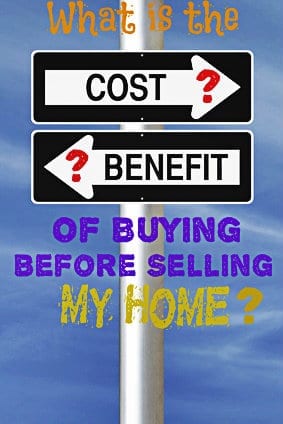Can I Buy a House Before Selling Mine?

Are you wondering how to buy a house before selling yours? You are not alone, as many folks wonder how to accomplish this feat.
Buying a new home before selling an existing property you own is one of those real estate topics I know gets debated quite a bit at the kitchen table across America.
That next home you’ve always wanted often happens unexpectedly.
You might be browsing online housing ads, or you may just be driving into a neighborhood you like when you see it – a perfect house you want and for a fair asking price to boot.
It’s possible you weren’t even house-hunting at all.
Unfortunately, you are still making payments on your current home.
You haven’t put it on the market yet, or you have, but it has yet to sell. Either way, you are in a tight position.
Buying another house before selling your current house is risky for anyone without a high income. It is possible, but for most people, it is not recommended.
If you have not spoken to a real estate agent, they will probably recommend selling your house first.
From thirty-eight years of experience as a Realtor, prospective buyers need to understand that if you need to write a contingent offer, it will not be looked at favorably by sellers.
This is especially true in a competitive market.
It might work in a buyer’s market, but you can probably forget about it if market conditions favor sellers. When it’s a hot market, sellers are in the driver’s seat.
The sale of your current home could quickly get in the way of having a successful real estate transaction. The question is, does buying a home before selling yours make sense?
Only you can decide, but there are some things worth considering.
Facts and Statistics to Know
1. Bridge loans can help finance the purchase of a new home before selling your current one.
2. Renting out your current property can provide additional income while you look for a new home.
3. Negotiating a more extended closing period with the seller of the new home can buy you more time to sell your current house.
4. Before listing for sale, consider temporary housing options, such as staying with family or renting, while transitioning between homes.
5. Working with a real estate agent experienced in buying and selling coordination can help navigate the process smoothly.
6. Approximately 40% of homebuyers in competitive markets carry two loans to purchase a new home before selling their current one.
7. Surveys indicate that 75% of successful buyers who purchased before selling their homes had financial plans for managing dual mortgages.
8. According to market data, the average time it takes to sell a house is around 60 days, providing an opportunity for buyers to find a new home during that period.
9. Research shows that effectively staging and presenting your current home can increase the chances of receiving competitive offers, allowing for faster sales and a smoother transition.
10. Studies suggest that homebuyers who procure pre-approval from lenders are more likely to secure financing quickly, facilitating buying a new house before selling theirs.
Home Sellers Want Potential Buyers to Be Qualified to Purchase
There are a few things that are a given when it comes to real estate sales. For home sellers, that translates to feeling confident their prospective buyers are more than qualified to purchase.
From a financial perspective, they want to know if the buyer has a solid down payment and a good credit score. Sellers also want to know if you have a debt-to-income ratio (DTI) and monthly income to support the purchase.
Most importantly, they want the sale of your home not tied to buying their property. Most sellers want to be confident that the agreed-upon closing date will happen so they can plan accordingly.
Home loans tied to a buyer’s current residence selling are not something any seller wants to see. Any good real estate agent representing a seller will ask a buyer’s agent to produce a rock-solid pre-approval letter.
Home buyers need to understand this means proving you don’t need to sell your current house before closing on a second home.
Expect Real Estate Agents to Ask Lenders For Specific Language
A mortgage lender is often asked to put language into a letter stating this fact. Without this language, it will be assumed your new purchase is tied to your current property selling. We will talk about this a bit later.
You must be prepared to prove you’re financially capable of buying a house before selling your current house. So, why on earth would you want to go through all of this aggravation?
Why not just sell your house first? Let’s take a look at some of the common reasons.
Benefits of Buying a House Before Selling Your Current House
Even though most buyers are in no position to buy before selling their current property, there are still a few benefits worth mentioning.
There is a reason you considered the idea in the first place. Reviewing what you would have to gain might be beneficial. You’re probably considering buying first because you found a property you want. It could also be so great that you cannot pass it up.
The reason could be more space is needed, but you just haven’t gotten around to being a serious home buyer yet.
This is a legitimate reason to want to buy a home. Opportunities like this can pop up, even if you have yet to sell your house. Everyone intends to get a great deal and has a dream home, whether they have thoroughly thought through the idea.
When you come upon a house that fits these criteria, it can trigger emotions and desires. You can picture yourself perfectly living in this new place. Maybe seeing how much money you will net once you sell your home is appealing.
You can also look forward to a smooth transition once you sell your house because you have already purchased your new one.
If you have the finances, you may even see the potential benefits of carrying both houses – the old one with renters paying the mortgage while enjoying your new home. See, should I rent or sell my house for the considerations?
This could be especially worthwhile if the Real Estate market is rising. You see the potential to sell your home for more profit.
Doing Work Before You Move In
 Another significant benefit to buying another home before selling your current property is the ability to go ahead and make the improvements you desire so it is a place you will want to call home.
Another significant benefit to buying another home before selling your current property is the ability to go ahead and make the improvements you desire so it is a place you will want to call home.
Some improvements that are much easier to complete with a vacant home are refinishing hardwood floors and painting. Remodeling projects like kitchens and baths will become more straightforward.
Many would kill to have these things done before the moving truck ever pulls into the driveway.
All of these benefits are things you might gain from buying another house before selling yours.
However, looking at the risks of such a proposition is worthwhile. There are reasons why so few people go this route.
Risks of Buying a House Before Selling Yours
What is Your Financial Picture?
Buying a home before selling your current house can bring with it a lot of financial risks. The first thing to consider before purchasing a new house is your finances.
Can you afford to pay both mortgages for an extended period? Are interest rates on the rise?
Will you need a second mortgage or a home equity loan? Maybe a HELOC would be best? These options will be a short-term loan. They will be an excellent choice to get you through the closing process until your current house sells.
The mortgage lender will want to know your finances, which you should be clear on before jumping in. Selling a house is an uncertain business. It could take months to sell, especially in a buyer’s market.
If all things go well, this will not be the case. But you must be able to cover the payments on both mortgages for some time.
If you do not have this kind of money, you probably should not buy a house before selling your current house. However, there are other ways that people have accomplished this, so they are worth mentioning.
Other Solutions and Alternatives
Some of these include asking a family member for financial help for a short period until the old home sells. This might even be the time to ask your rich uncle for help so you can make a cash offer.
Cash offers can be very appealing because they remove all risk and uncertainty. It is the perfect solution if you have it. You avoid all the hassle of getting a traditional mortgage. Once you have sold your home, you can pay off your relative with the proceeds.
Whether they are an option in today’s market is another story and will depend heavily on your particular money situation, the lending market, and whether the housing market is currently for buyers or sellers.
Some folks are in the enviable position of buying and selling a home simultaneously with no financial stress. Unfortunately, this is not the case for most of the population.
What’s Not Looked at Favorably When You Need to Sell a House First
Home Sale Contingencies
 Few sellers are interested in home sale contingency clauses. The chances are very slim a prudent seller will accept sales contingencies for houses – especially in a seller’s market.
Few sellers are interested in home sale contingency clauses. The chances are very slim a prudent seller will accept sales contingencies for houses – especially in a seller’s market.
By making a sale contingency offer, you tell a seller that you will buy their house for a specific price if and when your home sells.
You put your home up for sale as soon as you decide to do this. The hope is that it sells quickly so you can buy the new house. Typically, you would ask for an extended period to get your property under contract.
The problem with this arrangement and why so few home sellers accept it is that they lose control of their real estate transactions. A seller has no idea if you will do what it takes to sell your home.
They don’t know if you will price it correctly, market it right, or even have the best Realtor to sell it. The seller is virtually at your mercy to do what it takes to move on to the next phase of the transaction.
On the other hand, without accepting this type of real estate contingency, the seller can still do what is necessary to get their place sold by dropping the price.
They certainly know if you are truly serious when you put your home under contract, you will be back anyway.
A Right of First Refusal
Another typical arrangement in some Real Estate contracts is a right of first refusal. You establish agreed-upon terms in a contract. You will give a specified amount of time that the seller has to provide you to exercise your right to proceed with the transaction should the seller receive another offer.
When the seller gets another offer, you have a short period (typically 24 -48 hours) to purchase the home before the deal dissolves. It doesn’t matter whether you have sold first or not.
Today, most sellers do not need to deal with contingency clauses. But it could be worth asking if you have no choice.
I need to make it painfully clear about this because the chances are incredibly remote the seller will accept either of these arrangements.
When you submit an offer, an excellent listing agent representing the seller will want to know if you can qualify to purchase without selling your current home.
Documentation is Mandatory
One of the requirements I will have for any buyer who currently owns a home and puts an offer in on one of my client’s homes is to provide a mortgage pre-approval letter that states precisely that.
The language must be explicit – “the buyer does not need to close on their existing home to make this purchase.” This assures the seller that they do not need to worry about a customer completing a transaction before acquiring their next property.
Otherwise, a buyer could use the mortgage contingency clause in most Real Estate contracts as an escape clause to get their deposits back.
Regarding the right of first refusal, accepting this kind of contract does not make sense unless the seller knows you can qualify to buy their home without selling.
A ready, willing, and able buyer has made an offer on their home – why would they want to turn around and wait for someone who doesn’t even qualify to complete the sale to say yes or no?
They would be losing a buyer in hand who has nothing to sell!
Real-World Examples
A few years back, while working with a buyer client in Southborough, Massachusetts, even though I had explained that most home sellers would not accept a contingency sale and needed to get their home sold first, they didn’t listen.
Unfortunately for them, it took losing a home they wanted before coming to grips with the fact that they needed to get their home listed and sold first.
After being in the Real Estate business for over 38 years, I find this needs to be explained quite a bit. Many buyers think sellers are going to accept their contingency offer.
Many have in the back of their mind that this is normal or that they have a very salable home. I’m sorry, but it does not work that way!
A seller could care less that YOU think your home is marketable. If you need to sell a house, you’re not in a good spot to make offers. When you have a home to sell, you’re coming with baggage.
Bridge Loan or 2nd Mortgage
You may have heard of a bridge loan, but do not bet on being able to get one. Bridge loans allow you to combine the old and the new home payments. It makes it possible to transition from one residence to another.
However, the catch with bridge loans is that you need considerable finances and excellent credit scores.
It would mainly help if you were a rare few who could afford the dual mortgage payments without the loan. A bridge loan was relatively conventional many years ago, but this type of financing is rare nowadays.
In today’s mortgage world, you would get another mortgage. The lender would qualify you to carry your existing and new mortgage. This is a standard route for those qualifying to carry two mortgages.
A mortgage broker will often set up your loan so that you make a minimum down payment and finance the rest. Even though you will have private mortgage insurance (PMI), it will only be paid until your sale closes.
Remember, the interest rates could be higher, and there are closing costs.
Renters Can Help You Buy a House Before Your Current House Sells
 When clients ask how they can buy a house before selling it, one suggestion is renting their current home. Making your first home rental property will cover some of your debt to help you get into the next house.
When clients ask how they can buy a house before selling it, one suggestion is renting their current home. Making your first home rental property will cover some of your debt to help you get into the next house.
This is another avenue you can look into when buying a home before selling the one you own.
You may think you can just rent out the old house to cover the mortgage while moving into your new home.
While this is an option, it does carry some risks. Renters can lead to severe wear and tear on your property. They have little incentive to treat it with love and care.
If you plan on keeping renters there until you can sell it, you may encounter even more problems. Your renters may want to continue living there.
It might make it unnecessarily challenging to show the house because of this.
Regarding finances, the lender will only count a portion of the rent you collect into the equation of whether or not you qualify to carry both mortgages.
Remember this, and do your due diligence before offering your dream home.
Make a Home Purchase Only If Financially Wise
Not everyone sells their current home before purchasing a new House. However, the reality of buying a home makes such actions inadvisable for most.
You may be able to do it, but make sure it is a smart financial move. In my experience, most homeowners will get their home sold first and then make an offer on their next place.
Doing so removes quite a bit of stress from the equation. You are far from the next step when the home-selling process has not started.
Of course, the next worry will be selling your home before you have found another home you want to buy. This brings different things to keep you up at night.
For example, finding temporary housing and a place to store all your belongings. Renting a storage unit is a standard solution.
These, of course, are legitimate concerns as nobody likes to think about making a “double move.”
In Real Estate, we call the decision process for buying before selling or vice versa the “chicken and egg question.” Which option makes the most sense based on your life and financial position?
Only you can decide that, but these are the things you need to consider.
Recap of The Pros and Cons of Buying Before Selling
Let’s look at the advantages and disadvantages one last time.
Pros
You will have a place to live: If your previous home is quickly sold, you won’t have a place to go. Moving is never an enjoyable experience.
Having the freedom to move into your new house at any time or gradually is enticing. Transporting your belongings instead of doing it all at once can alleviate stress.
Move fast on properties you love: Sometimes, the availability of properties remains limited. Attractive homes are quickly snatched up within days of being listed.
Therefore, if you come across your ideal home, it is advisable not to delay. There is a high likelihood that it will be sold within a month or two.
Avoid extra costs: By having a new home already prepared, you can eliminate concerns regarding the expenses of temporarily storing or moving your furniture. These costs could accumulate significantly, reaching thousands of dollars as time passes. Additionally, you can avoid the need to pay for moving expenses twice.
You don’t need to worry about showings: Maintaining the cleanliness of your current residence during open houses and private showings can be pretty challenging. Even more so when you have pets or young children.
Additionally, it can be unpleasant to deal with disrupted routines and the need to find alternative places to stay.
Cons
Ways to finance your new home: Most potential buyers rely on the funds from selling their current residence. They allocate a portion of the profit towards the down payment.
However, if you do not possess substantial savings or easily accessible investments, purchasing before selling may require additional financing options. You may need a second mortgage.
Holding two loans: Carrying two mortgages can significantly impact your budget. If approved for a second mortgage, you will be responsible for making two monthly house payments. It can be significant money.
Additionally, there are other expenses to consider, such as utility bills and property taxes, that come with running two households.
Seller uncertainty: Potential sellers may have reservations about buyers who want to purchase a new home before selling their existing one. This is because it introduces an element of uncertainty regarding the offer being made.
Some homeowners may prefer to avoid this situation altogether. The sellers of the home you are looking to purchase may be worried about your financial capability to afford the new property.
The possibility that you might back out or delay the transaction if you encounter difficulties selling your current home can be frightening.
Final Thoughts
As you can see, there are risks and benefits of buying a new property before you have sold your current home. Hopefully, you are now better informed to make the right decision when buying and selling real estate at the same time.
About the Author: Bill Gassett, a nationally recognized leader in his field, provided information on how to buy a house before you sell yours. He is an expert in mortgages, financing, moving, home improvement, and general real estate.
Learn more about Bill Gassett and the publications he has been featured in. Bill can be reached via email at billgassett@remaxexec.com or by phone at 508-625-0191. Bill has helped people move in and out of Metrowest towns for the last 38+ years.
Are you thinking of selling your home? I am passionate about real estate and love sharing my marketing expertise!
I service Real Estate Sales in the following Metrowest MA towns: Ashland, Bellingham, Douglas, Framingham, Franklin, Grafton, Holliston, Hopkinton, Hopedale, Medway, Mendon, Milford, Millbury, Millville, Natick, Northborough, Northbridge, Shrewsbury, Southborough, Sutton, Wayland, Westborough, Whitinsville, Worcester, Upton, and Uxbridge MA.

